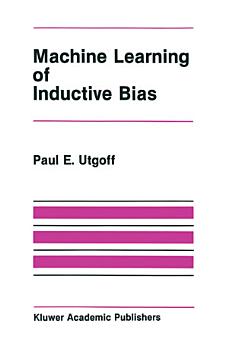Machine Learning of Inductive Bias
Paul E. Utgoff
ธ.ค. 2012 · The Springer International Series in Engineering and Computer Science หนังสือเล่มที่ 15 · Springer Science & Business Media
eBook
166
หน้า
reportคะแนนและรีวิวไม่ได้รับการตรวจสอบยืนยัน ดูข้อมูลเพิ่มเติม
เกี่ยวกับ eBook เล่มนี้
This book is based on the author's Ph.D. dissertation[56]. The the sis research was conducted while the author was a graduate student in the Department of Computer Science at Rutgers University. The book was pre pared at the University of Massachusetts at Amherst where the author is currently an Assistant Professor in the Department of Computer and Infor mation Science. Programs that learn concepts from examples are guided not only by the examples (and counterexamples) that they observe, but also by bias that determines which concept is to be considered as following best from the ob servations. Selection of a concept represents an inductive leap because the concept then indicates the classification of instances that have not yet been observed by the learning program. Learning programs that make undesir able inductive leaps do so due to undesirable bias. The research problem addressed here is to show how a learning program can learn a desirable inductive bias.
ให้คะแนน eBook นี้
แสดงความเห็นของคุณให้เรารับรู้
ข้อมูลในการอ่าน
สมาร์ทโฟนและแท็บเล็ต
ติดตั้งแอป Google Play Books สำหรับ Android และ iPad/iPhone แอปจะซิงค์โดยอัตโนมัติกับบัญชีของคุณ และช่วยให้คุณอ่านแบบออนไลน์หรือออฟไลน์ได้ทุกที่
แล็ปท็อปและคอมพิวเตอร์
คุณฟังหนังสือเสียงที่ซื้อจาก Google Play โดยใช้เว็บเบราว์เซอร์ในคอมพิวเตอร์ได้
eReader และอุปกรณ์อื่นๆ
หากต้องการอ่านบนอุปกรณ์ e-ink เช่น Kobo eReader คุณจะต้องดาวน์โหลดและโอนไฟล์ไปยังอุปกรณ์ของคุณ โปรดทำตามวิธีการอย่างละเอียดในศูนย์ช่วยเหลือเพื่อโอนไฟล์ไปยัง eReader ที่รองรับ








